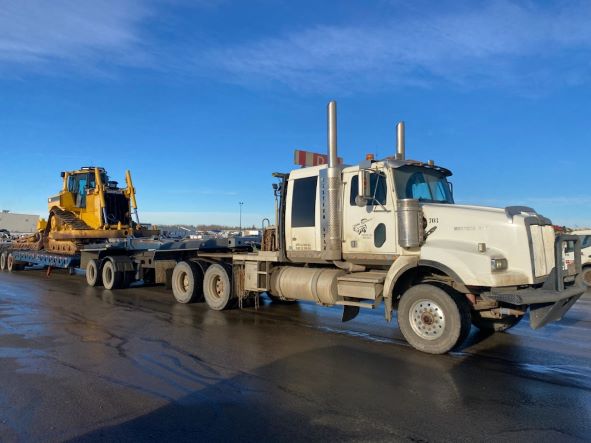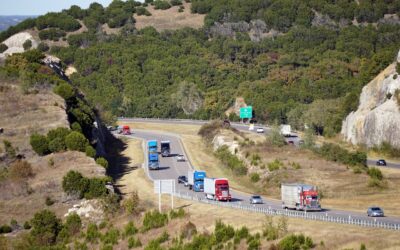If you’re a farmer, a construction company, or anyone who needs to transport heavy equipment in North America, finding a reliable heavy-haul trucking company is crucial. While each region varies in terms of weather, road conditions, and terrain, there are several essential points about safety in heavy hauling that remain the same wherever you’re shipping to or from. In the tri-state area of Tennessee, Mississippi, and Arkansas, there are some overlap and unique differences. This guide will focus on Mississippi and provide five essential things to keep in mind about heavy hauling in the Magnolia State.
Know Your Dimensions
Mississippi has specific rules about the size and weight limits for oversized and super loads. Ensure you measure your equipment accurately and follow these regulations to avoid legal headaches or delays. Knowing the dimensions will also help the driver determine the right equipment and plan the best route for your shipment.
If you’re unsure how to get the dimensions of your equipment, Trusted Dispatch has a Specs tool that can help you. With over 60,000 makes and models pre-loaded, you can enter your machine’s make and model, and the tool will find the closest base model. Add-ons or customizations are not automatically calculated, so you’ll need to add those to your measurements. You can also provide images of your equipment to help your driver get a visual of the load and prepare in advance.
Knowing the dimensions will also help the driver determine the appropriate equipment and plan the most efficient route for your shipment. By having accurate measurements, you’ll be able to streamline the entire process and ensure compliance with regulations.
Get Your Permits
Transporting oversize loads means that you need the correct permits. In Mississippi, there are several permits and documentation you may need to secure, depending on the specs of your load. Here are some standard permits required for heavy hauling in Mississippi:
- Oversize/overweight permit: This permit is necessary when transporting heavy machinery that exceeds the legal weight and size limits established by the state.
- Trip permit: If you’re hauling a load through Mississippi from another state, you may need a trip permit. This permit grants temporary authorization to travel through the state with an out-of-state vehicle.
- Specialized hauling permit: This permit covers specific requirements and restrictions associated with unique loads, such as wide, tall, or loads with specific configurations.
- Escort vehicle permit: This permit authorizes using escort vehicles, such as pilot cars, that accompany the heavy haul truck to warn and guide other motorists on the road. These are typically needed if you are hauling a super load.
Working with a heavy haul driver that knows the permitting process is critical. Give yourself plenty of time to get permits to avoid fines and delays.
Map Your Routes
Planning the most effective route for your drive is vital to avoid unnecessary detours, road restrictions, or low-clearance bridges. Drivers have a lot to consider when planning their route, including but not limited to:
- Low bridges
- Narrow mountain roads
- Snow sheds
- Power lines,
- Road bans
The driver should consider weight capacities, height restrictions, and road conditions to minimize obstacles and delays.
Use the Right Equipment
Using the right equipment is imperative to a successful heavy haul. A wide variety of trailer options are designed for different-sized loads with a range of maximum weights and other specs. Let’s look at a few of the most common ones:
- Step Decks: Feature lower and upper decks, ideal for transporting oversized and tall machinery, as they provide more vertical clearance than a standard flatbed.
- Goosenecks: A distinct forward extension connects to the towing vehicle, forming a “gooseneck” shape. They have removable ramps to easily load and unload heavy machinery.
- Lowboys: Designed to accommodate taller equipment. They have multiple axles to distribute the weight evenly and ensure stability during transit.
When selecting a heavy haul driver, ensure they have the right truck and trailer to accommodate your equipment. An experienced professional will regularly inspect and maintain their equipment to ensure it works properly and minimize transit breakdowns.
Get A Professional Driver
A professional driver can make all the difference in the successful delivery of your equipment and machinery, whether it’s your own load, something you’re selling, or equipment you’re renting. Look for a heavy haul trucker who prioritizes safety, communication, and customer satisfaction.
Trusted Dispatch is a load board with a network of drivers across Canada and the United States that offers door-to-door service and excellent customer service for your heavy haul transport. You can trust that the drivers in our network are vetted and insured and can get your equipment anywhere it needs to go. Get started today with your instant, free quote.





